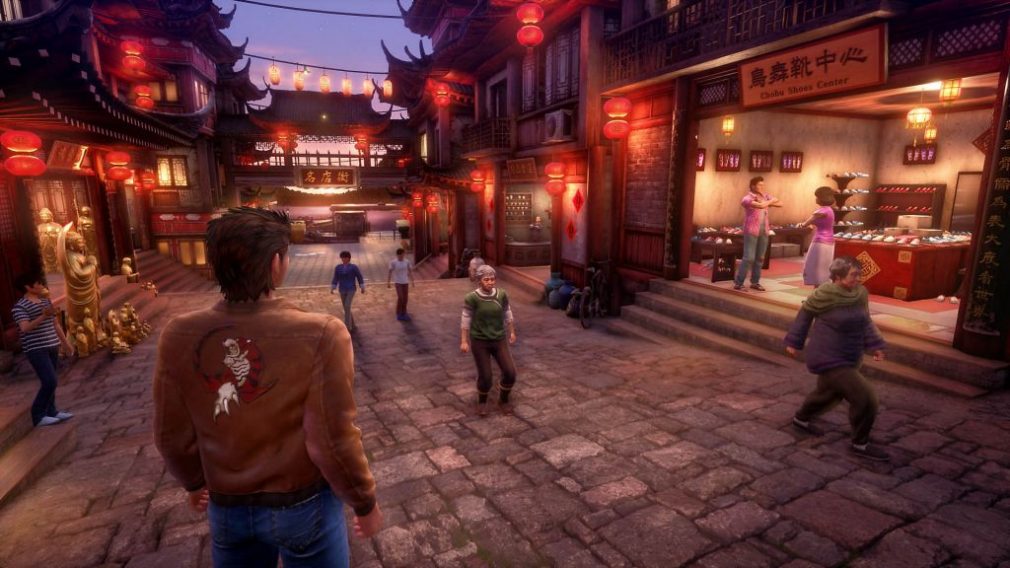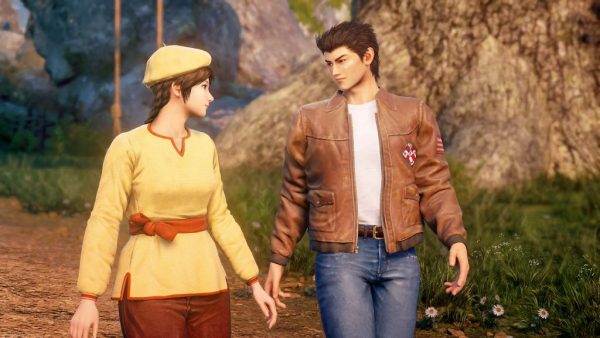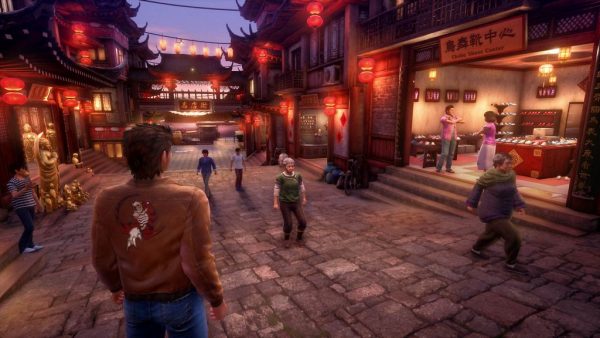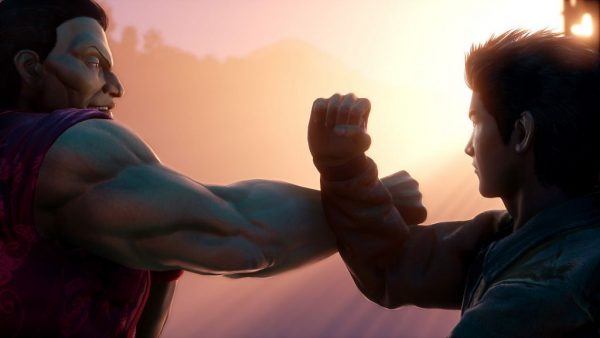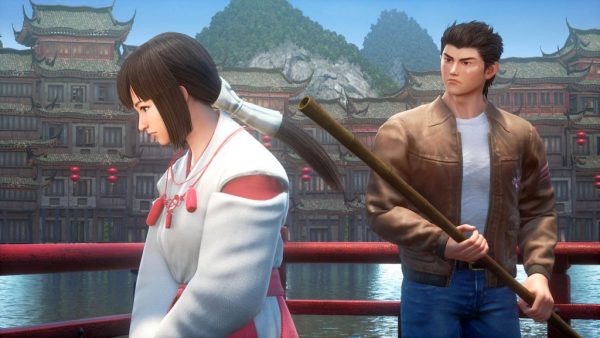Also On: PC
Publisher: Deep Silver
Developer: Ys Net
Medium: Digital/Disc
Players: 1
Online: No
ESRB: T
For what seems like a lifetime, fans of the Shenmue series on the Sega Dreamcast waited with bated breath for a sequel. After years of wishing and waiting, a promised sequel was announced, and after an ultra-successful Kickstarter campaign, we are finally blessed with Shenmue III. Well, was it worth the 17+ year wait? Read on.
For those who have never played Shenmue, the plot revolves around teenage martial artist Ryo Hazuki In 1986 Yokosuka, Japan. One day, Ryo returns to his family dojo to witness a confrontation between his father Iwao and a Chinese man, Lan Di. Ryo intervenes, but is easily incapacitated. Lan Di demands Iwao give him a mysterious stone artifact known as the dragon mirror. After the exchange, Lan Di Kills Iwao in front of Ryo. Now, fueled by revenge, Ryo begins a Journey that takes him throughout Yokosuka over several months as he pieces together clues on where to find Lan Di. It all leads to Ryo having to journey to Hong Kong where he continues is quest of revenge in the sequel, Shenmue II.
This part of his journey is far larger than the previous with even more secrets about his family uncovered. The ending of Shenmue II left fans with a strange feeling. Toward this climax, the story took a strange fantasy turn and, without spoiling anything, ended with a rather heavy cliffhanger. After that, nothing, nothing at all for almost 17 years. Now enter Shenmue III for the PlayStation 4, with the story picking up right where part II ended. While this could be jarring for new players, they have included a ?Digest Movie? where you can get caught up on the story so far. This also serves as a sort of refresher for those who have played through the other games but may have forgotten where it paused. If you?ve never played any of the games, the digest movie doesn?t give you the feeling of what it actually felt like to play through. I do highly suggest that you play through the first two games (which are available on the PlayStation 4 and Xbox One in a double pack) before diving into this third chapter.
When I fired Shenmue III up for the first time, it felt strange. The controls took a bit to get used to since now we have more control over the camera (Thanks to the second Analog stick), but the big focus was on how the visuals looked. While they are mostly gorgeous to look at, some details look blurry and there is some slowdown in odd places. The loading times also seemed a bit excessive, as it took a few minutes before I was able to control Ryo myself, only to have control taken from me again in a cut scene. Initial impressions are not mind blowing, but as you play on, everything begins to feel more natural and you get used to everything. The music on the other hand is absolutely awesome from the start, and really keeps with the tradition of the first chapters and their fantastic scores.
Game play has remained largely unchanged from Parts 1 and 2, but with some interesting changes. There is a larger emphasis on completing tasks that get you one step closer to a main goal. In the earlier chapters, it was common to complete tasks for people before you could get anywhere with your current objective. It worked like this, 1. Begin objective. 2. Ask someone about current objective, 3. Complete a task for person before they will help you. 4. Complete Task and return to person, 5. Person tells you to seek the help of someone else. Rinse, Repeat. It wasn’t terrible to accomplish, but it did pad out the story a little. Part 3 takes this mechanic to a new level, with almost everyone with information forcing you to do something before they will even begin to help. This does make the game seem like its dragging on and on, but once you are able to leave the first village (which does take a bit) the game picks up and begins to feel more like Shenmue.
QuickTime Events also make a return, but this time if you fail in one, you can try again right away instead of having to play a whole scene again. In the previous games, you were on a sort of time limit where you had to sleep at the end of a day. This makes a return along with a new eating mechanic where you have to eat regularly to keep up your stamina. In order to do this, you must earn money from the various jobs available and buy food at local shops and stands. The jobs vary from easy to slightly annoying, the best job was, in my opinion, driving the forklift. This is a return affair from the first Shenmue, and while it’s in a smaller area and doesn’t last the full day, you can earn way more money than with the smaller jobs. The gambling also makes a return, but it is way too hard to win anything, and sometimes takes too long for what little cash you can earn. I used the gambling as a distraction for the most part, as other jobs will provide you with more funds.
Other additions include a revamped leveling up system. Now you can spar with individuals and also train by yourself to increase your life bar and master new moves for free fighting. This really helps out later on as some of the free battles are difficult unless you are prepared. Controlling Ryo in free fighting has also been revamped and somewhat simplified. You don’t have to worry about any directional movements while fighting like in the first two games, but rather just use the left analog to face the enemy, and press a series of buttons to pull off moves. The right analog stick will change your focus to another opponent if you?re fighting more than one. Some of the free battles have to be won with a certain move or you may be forced to lose to continue the story, but the game will let you completely deplete the enemy’s life bar before letting you know you have done anything and everything wrong. It?s a little annoying, but only happens a few times.
Once huge gripe I have with Shenmue III is the story’s pacing. With all of the tasks you must complete and the job system, things can feel tedious. Mix this with the fact that very little attention is paid to Ryo’s main goal of getting revenge for his father. Most of the story surrounds Shenhua (from part II) and her missing father. His story does move forward at times, but not swiftly at all. It is a strange choice for sure, but Yu Suzuki does hope a part 4 will be made someday, let’s just hope it’s not another 17 year wait.
After completing my original play through, I must say that I was left unfulfilled with Shenmue III which is why I give this a lower than expected score. I was expecting much more than I got with this release, but the experience as a whole was not disappointing at all. I will play through it a few more times that’s for sure. Even with the pacing issues, and the changes made to the game play, I still had fun. My experience and expectations should not deter anyone from trying Shenmue III or its previous entries, as this is the type of game where everyone will have a different experience and can’t be defined by one person?s opinion.
Is Shenmue III a good game? Most definitely. Was it worth waiting 17 years for? I will have to say no. It is longer than the first two, but it seems to have less substance. However this doesn’t mean it’s not worth your time. I do recommend this to Shenmue fans but I do caution first timers about the overall pacing. Patience wins over brute force here, and this game will demand the most patience out of all of the Shenmue games. It may not seem worth the long wait, but in the end, Shenmue III does more right than wrong and it belongs in your game collection.
Deep Silver provided us with a Shenmue III PS4 code for review purposes.

